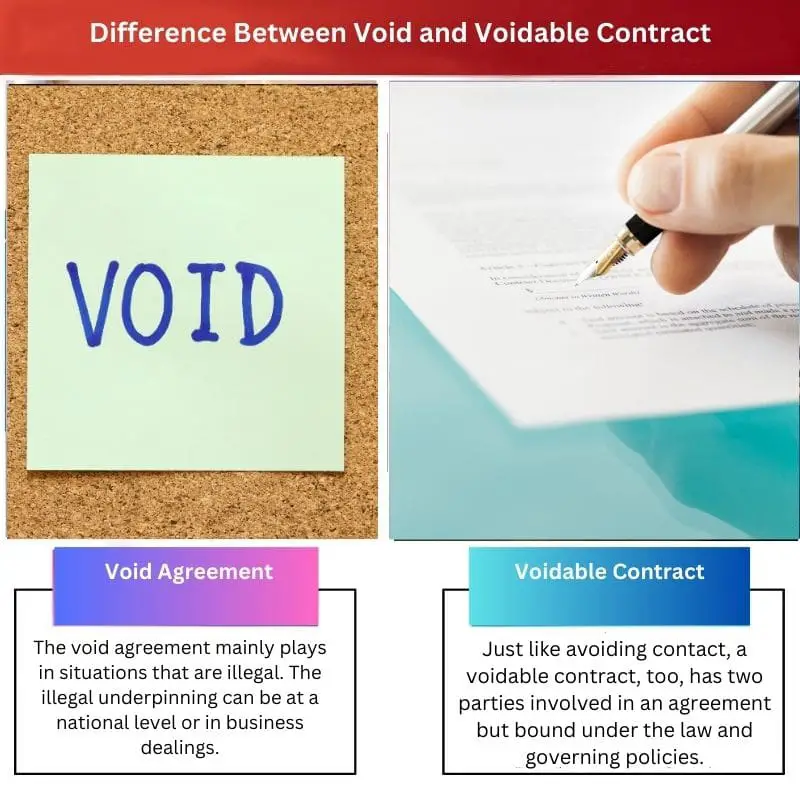A void contract is invalid from the outset, lacking legal effect, often due to illegality or impossibility. A voidable contract is initially valid but can be canceled by one party due to factors like fraud, coercion, or incapacity, rendering it unenforceable at the option of the aggrieved party.
Key Takeaways
- A void contract is a contract that is not legally binding from the beginning and cannot be enforced by either party.
- A voidable contract is a contract that is binding until one party chooses to void the warranty due to a legal defect or misrepresentation.
- A void contract is considered invalid, while a voidable one is considered valid until voided.
Void vs Voidable Contract
A void contract is a legal agreement that has no legal effect from the beginning and therefore cannot create any rights or obligations for the parties involved. A voidable contract is a legal agreement that is initially valid and enforceable but can be voided by the parties involved.

Void means ‘Voi ab ignition in law terms, null or void.
Void agreements are nullified from the beginning, while voidable contracts are valid and can get void later on.
A void agreement is considered valid only at the time when it was created but later can be considered invalid. In contrast, the voidable contract is considered to remain active until one of the parties calls it off or the stipulated time of the validity of a contract ends.
No parties can claim damages that occur per the void agreement, but the claim can be made in the voidable contract as they are legalized.
Comparison Table
| Feature | Void Contract | Voidable Contract |
|---|---|---|
| Validity from the Start | Invalid | Initially Valid |
| Enforceability | Unenforceable | Initially Enforceable, but Can Be Voided |
| Reason for Invalidity | Lacks essential elements, illegal, formed under duress, etc. | One party lacked capacity (minor, mentally incapacitated), fraud, misrepresentation, etc. |
| Effect of Voiding | Contract treated as if it never existed | Contract becomes void if the injured party chooses to void it |
| Option to Void | No Option | Option for the Injured Party Only |
| Example | A minor entering into a contract to purchase a car | A contract signed under duress |
What is Void Agreement?
A void contract is a legal agreement that is considered invalid from the outset, lacking any legal effect. Such contracts are deemed as though they never existed, meaning they cannot be enforced by either party.
Lack of Legal Capacity
If one or more parties involved in a contract lack the legal capacity to enter into an agreement, such as minors, individuals under the influence of drugs or alcohol, or mentally incapacitated persons, the contract may be deemed void. This is because these individuals are unable to fully understand the terms and implications of the contract, rendering their consent invalid.
Illegality
A contract that involves an illegal act or purpose is void. This includes contracts that violate statutory laws, public policy, or are contrary to the principles of morality. For example, contracts for the sale of illegal drugs or contracts that encourage illegal activities are considered void.
Impossibility
If the performance of the contract becomes impossible due to unforeseen circumstances beyond the control of the parties involved, the contract may be deemed void. This could include situations such as destruction of the subject matter of the contract, changes in law rendering performance illegal, or the death or incapacity of a necessary party.
Lack of Formalities
Certain contracts may be required to meet specific formalities, such as being in writing or signed by authorized parties, to be legally enforceable. If these formalities are not met, the contract may be considered void.

What is Voidable Contract?
A voidable contract is a valid agreement between two or more parties that can be legally voided or affirmed by one or more of the parties involved. Unlike a void contract, which is considered invalid from the outset, a voidable contract is initially enforceable but carries the possibility of being canceled or rescinded under certain circumstances.
Grounds for Voidability
Misrepresentation
If one party makes a false statement of fact that induces the other party to enter into the contract, the contract may be voidable. This misrepresentation can be intentional or unintentional, but it must be material to the contract and relied upon by the deceived party.
Fraud
Fraud occurs when a party deliberately deceives another party in order to induce them to enter into a contract. This deception may involve concealment of material facts, false promises, or other deceptive practices. Contracts entered into under fraudulent circumstances are typically voidable at the option of the deceived party.
Duress or Undue Influence
Duress involves coercion or threats that force a party to enter into a contract against their will. Undue influence occurs when one party exerts undue pressure or influence over the other, exploiting a position of trust or authority. Contracts entered into under duress or undue influence are voidable by the victimized party.
Mistake
A mistake made by one or both parties regarding a material fact of the contract may render it voidable. However, not all mistakes justify voiding a contract; they must be significant and mutual to meet the criteria for voidability.
Exercise of Right to Void
The party with the right to void a contract must act promptly upon discovering the grounds for voidability. They typically have the option to either affirm the contract and proceed with its terms or rescind it by notifying the other party of their intention to void the agreement.
Legal Consequences
If a voidable contract is successfully voided, it is treated as though it never existed, and the parties are restored to their pre-contractual positions. Any benefits received under the contract must be returned, and the parties are released from their contractual obligations.

Main Differences Between Void and Voidable Contracts
- Validity:
- A void contract is invalid from the outset and lacks any legal effect.
- A voidable contract is initially valid and enforceable but carries the possibility of being canceled or affirmed by one or more parties.
- Grounds for Invalidation:
- Void contracts are typically invalidated due to factors such as lack of legal capacity, illegality, impossibility, or lack of formalities.
- Voidable contracts may be invalidated due to factors such as misrepresentation, fraud, duress, undue influence, or mistake.
- Legal Consequences:
- Void contracts are treated as though they never existed, and the parties are released from any obligations.
- If a voidable contract is successfully voided, it is treated as though it never existed, and the parties are typically restored to their pre-contractual positions, with any benefits received under the contract returned.
- Exercise of Rights:
- Void contracts do not require any specific action to be taken to render them invalid, as they are inherently void.
- Voidable contracts typically require the aggrieved party to take prompt action to affirm or void the contract upon discovering the grounds for voidability.
- Nature of Flaws:
- Void contracts are fundamentally flawed or illegal from the outset.
- Voidable contracts are valid agreements that contain defects or vulnerabilities that allow one party to void the contract under certain circumstances.





